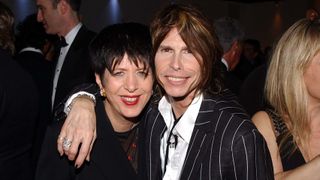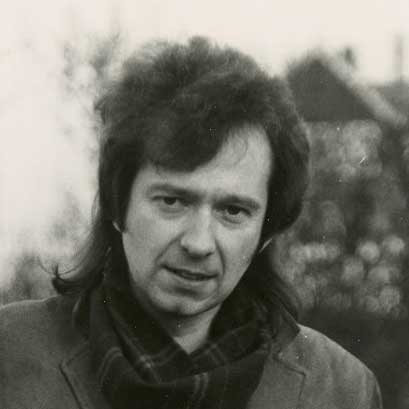Chatting with Diane Warren, it’s very easy to forget she’s a multi-millionaire with a reputed annual income of around $20 million, a significant chunk of which she donates to animal charities.
She’s won dozens of awards but is still starry-eyed when talking about winning the 2011 Golden Globe for You Haven’t Seen The Last Of Me, the powerful ballad Cher sings in the film Burlesque, confiding that she’d really like to be nominated for an Oscar.
Everyone knows a Diane Warren song, whether it’s I Don’t Want To Miss A Thing (recorded by Aerosmith), If I Could Turn Back Time (Cher), Because You Loved Me (Celine Dion), Nothing’s Gonna Stop Us Now (Starship), Time, Love And Tenderness (Michael Bolton) or How Do I Live (a hit for both LeAnn Rimes and Trisha Yearwood).
Her songs are mini-masterworks of pop song writing craft that any would-be writer would do well to dissect and analyse. Choruses full of hooks, verses jammed with catchy melodies, all seamlessly held together by lyrics that are universal enough for most listeners to identify with, without feeling that they’ve heard it all before.
Diane Warren writes across such a breadth of styles with such ease and confidence that her songs have been recorded by artists from Kiss to The Cult. These songs transcend genre and translate into many different music forms, often sung by hugely different performers. Her Don’t Turn Around, co-written with Albert Hammond and a UK No.1 for reggae band Aswad in 1988, has also been recorded by eight other artists, among them Ace Of Base, Tina Turner and Neil Diamond.
Because You Loved Me, written about the support and encouragement Diane received from her late father David Warren, and featured in the 1996 Robert Redford/Michelle Pfeiffer screen romance Up Close And Personal, has been recorded by 11 different artists to date, winning Warren a Grammy and nominations for both an Oscar and a Golden Globe award.
Warren has been writing hits for over 25 years, and even though her songs have been performed by the cream of rock royalty and pop’s most prestigious stars – including Bon Jovi, Rod Stewart, Tom Jones, The Jacksons, Heart, Ratt, Al Green, Whitney Houston, Pet Shop Boys, Chicago, Gloria Estafan, Christina Aguilera, Britney Spears, The Pussycat Dolls and Mariah Carey, among countless others – she still sounds like a fan when talking about calling Jay-Z to persuade him to put a new song she’s written on the forthcoming Beyoncé album.
“After I’d played him the song on my guitar he had her call me,” she smiles. “This is after just hearing it over the phone.
“I did a demo that wasn’t amazingly arranged or produced, and put a little keyboard cello part on it. The song is very hard to sing, but it sold it. She got the emotion through what I’d done. The album was finished but Beyoncé went back into the studio and was recording it a couple of days later.”
Warren’s I Was There made its way on to the track-listing of 4, Beyoncé’s latest album, and is almost certain to be a single.
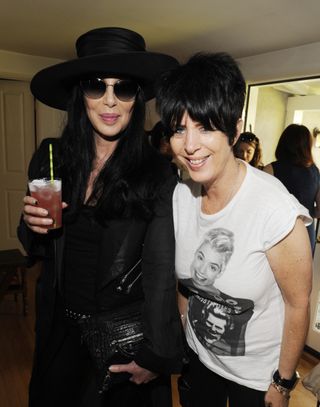
Diane Warren is endlessly enthusiastic about her songs. She demos them in exactly the same way she did when she started 27 years ago, on an old cassette recorder using only the most basic instrumentation, including a 1980s Yamaha DX7 keyboard. The cassettes are then passed over to one of several in-house engineers employed by her Realsongs company, to be turned into polished, produced demos that sound like finished records.
She arrives at her office at 8.30 am, six days a week, and often stays there for 12 hours. Fiercely tenacious, she usually writes in the mornings and spends the afternoons pitching her songs to artists, record producers and film companies.
Even though she has a team of 12 people – administrators, promoters, studio engineers and producers – working for her, and has a reputation for being a tough negotiator, it’s all about the songs for Warren. Financially, she need never work again; creatively, as she admits, she’d go crazy if she didn’t write songs.
What Warren doesn’t know about song writing probably isn’t worth knowing. If she was to appear on Mastermind, her specialist subject would undoubtedly be Pop Songwriters Of The 20th Century. It’s an interest that began for her very early on, as she explains.
“Growing up, I was influenced by songwriters, the whole 50s and 60s Brill Building thing. I was influenced by Carole King, but not Carole King the singer/songwriter – more Carole King’s work with Gerry Goffin, and the work of people like Barry Mann and Cynthia Weil, Burt Bacharach and Hal David. All those amazing writers from that amazing time.”
Despite her almost fanatical interest in pop music, and unlike many songwriters who originally started out as performers and subsequently became full-time writers, Diane never caught the performing bug.
“I didn’t want to be an artist and get up on a stage,” she explains. “I had really bad stage fright. I wanted to be the person behind the scenes writing the songs for everybody.”
Even so, with scores of hits worldwide, including over 100 in the US charts alone, it would be very easy to imagine that she’s been offered more than her fair share of record deals
“I might do a record someday, just for the hell of doing a record. Everyone should do one! When I meet with artists, I’ll often sing and play stuff to them. Even though I’m not a great singer, there’s passion and emotion in it, because I wrote the song.
“I always wanted to do Blame It On The Rain with strings,” Diane continues, referring to her 1989 US No.1 hit for pop duo Milli Vanilli. “I’d make a record by taking a couple of songs like that, that people know I wrote, and put them with some new ones.”
Recording such an album would be following in the footsteps of one of Diane’s great heroes, Burt Bacharach, who, in addition to writing for some of pop’s great vocalists like Dionne Warwick and Dusty Springfield, has also put out a series of his own solo records.
“Sure,” Diane nods. “And Burt’s not a ‘real’ singer. There’s just something cool about hearing those songs by the person they were born from.”
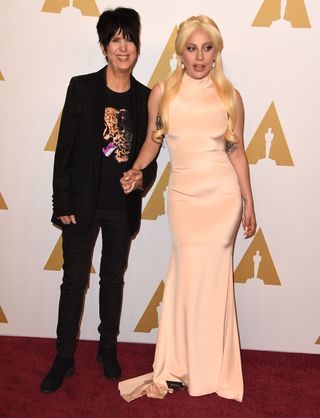
Many performers write their own songs, of course, but Warren doesn’t see this as a barrier to them recording one of hers. A case in point is her classic ballad from the 2000 Michael Bay blockbuster Armageddon.
“Aerosmith write great songs, but they were cool enough and open enough to do I Don’t Want To Miss A Thing, which gave them a whole new career surge. Once Steven Tyler sang it, it became an Aerosmith song.
“I’d written songs with Steven and Joe Perry a long time ago – around 1988 – and nothing happened. I think they used one of those songs, Devil’s Got A New Disguise, on their last album [the 2006 compilation of the same name]. After I’d written I Don’t Want To Miss A Thing, Kathy Nelson, who at the time was the head of music at Disney, said that since Steven’s daughter Liv was in the movie, why don’t we try and get Aerosmith to do it? As they write their own songs I never thought they’d agree.
“In the movie Bruce Willis, who plays the father of Liv’s character, dies. Steven saw that and found it very emotional,” continues Diane, adding: “It touched him, and he loved the song so much he agreed to do it. Steven is such a great guy. His heart is so on his sleeve.
“I remember sitting on the piano next to him while he was learning the song. Hearing that voice was one of those moments I’ll never forget. The song wasn’t alive until he sang it.”
It’s taken 13 years, but this winning team has recently been reunited, as Warren explains: “I was just in the studio with Steven last month and we did some things as good or better than that. It’s harder for an artist to convince the listener with someone else’s song. To me that makes you a greater artist because you’ve convinced me.
“It becomes their song and their record,” continues Diane. “I’m not going to nitpick and tell Steven Tyler how to sing. He’s such a great artist and a great singer, and when we were in the studio he was doing things his own way. He was making it fit him. By virtue of him singing it, he made my song better.”
After the success with Armageddon, Aerosmith had been planning to record another of Warren’s songs for inclusion in 2000’s Nicolas Cage-fronted remake of the classic chase movie Gone In 60 Seconds. Record company politics got in the way and The Cult recorded the song instead. “The Cult did a great version of my Painted On My Heart,” says Diane. “I have a demo of Steven doing it as well, which was different.”
Diane often comes up with a song title first, and then writes words and music simultaneously and unlike many songwriters, she doesn’t use soundalike singers as she doesn’t want to limit who the song can be pitched to. Often Warren will come up with a song and subsequently decide who she’d like to offer it to based on how it’s turned out.
“I wrote a song a couple of years back that I thought would be right for Lenny Kravitz,” she explains. “He did it and totally made it a Lenny Kravitz song. No one would know I wrote it.”
And while Lenny Kravitz and Diane Warren might sound like an unlikely fit, any doubts about how he might treat her song were quickly dispelled, as Warren remembers: “I was sure when I first heard him sing it. If you question it, it isn’t working. I didn’t question it at all. It sounded great.”
Warren’s father bought her first guitar when she was 10. By the time she was 14, she was writing three songs a day and David Warren was ferrying her to meetings with Los Angeles-based music publishers. Breaking into what seemed like a closed shop was a long and frustrating endeavour, though one that, 40 years on, she can now be philosophical about.
“Everything worth doing is a closed shop,” Diane observes. “I just kept knocking on publishers’ doors. I was very persistent and very insistent.”
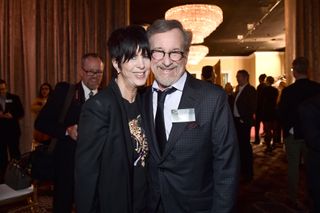
Her perseverance eventually paid off and, in 1983, Diane Warren accepted a staff writing job with Jack White, a producer who at the time was enjoying success with the singer Laura Branigan. Cologne-borne White’s real name was Horst Nussbaum, and he’d graduated from producing in Germany to making US and UK hits with Branigan, including Gloria and Self Control.
Jack White asked Warren to write English lyrics for a song by the French singer Martine Clemencau. The result, Solitaire, became a US Top 10 hit for Laura Branigan later in 1983, and Warren was on her way. Hot Night, another track for Branigan, was the first of Diane’s songs to be used in a film, in this case for the soundtrack of super-successful 1984 blockbuster Ghostbusters.
Warren’s Rhythm Of The Night was then picked up by Motown’s Berry Gordy for his film The Last Dragon and recorded by the family band DeBarge.
A dispute between Warren and White caused Diane to leave in 1985. She’s subsequently said that the deal with White wasn’t a good one and that the success with the DeBarge song – No.3 on the US Top 100 chart and No.1 on the Adult Contemporary chart – meant she was now a hot property. Publishers were making her the sorts of offers that White was reluctant to match. But Warren’s lawyer suggested that she should leave White and start her own company, rather than sign with another publisher.
Realsongs was set up in 1985, after Diane and White personally settled their dispute. “I kept my publishing and never looked back. The deal with Jack White was the best thing that ever happened to me.”
Warren moved into her own small studio in a nine-storey building on Hollywood’s Sunset Boulevard. RCA Records’ offices were in the same building, and she became friends with someone from A&R who thought that Nothing’s Gonna Stop Us Now, which Diane had composed with British songwriter Albert Hammond, might work for Starship. The band – formerly known as Jefferson Starship – had re-invented themselves away from the agit-prop collective that grew out of Jefferson Airplane (one of the classic 1960s San Francisco bands), and had started having hits with tracks like We Built This City and Sara.
The process turned out to be a lot easier than Warren was expecting. “The song went off to the band and they did it,” she explains. “Usually it doesn’t happen like that.”
Nothing’s Gonna Stop Us Now became a massive hit, reaching No.1 in both the UK and the US in spring 1987. The song had been used for the soundtrack of ’87 romantic comedy Mannequin and graphically demonstrated how successful the ever-growing symbiotic relationship between the movie industry and the record businesses could be. The record promoted the film and the film promoted the record, setting a very lucrative game plan for Warren’s career that continues to this day.
“I’ve always done songs for movies, starting with Ghostbusters and then The Last Dragon,” she says. “I did all the original songs for Coyote Ugly, and also Pearl Harbour. Up to date, Jennifer Hudson is starring in a movie about the life of Winnie Mandela, and I’ve written a song for that.”
Warren says she has no interest in writing film scores, but obviously relishes the exposure that comes from having a song featured worldwide as part of a blockbuster movie. The process can vary from project to project, but unlike with records, where she usually approaches artists with a song she’s already written, for movies she tends to write something specifically.
“The best thing to do is just see the movie,” she says. “If that isn’t possible I’ll read the script or meet with the director. With Winnie, I’d heard about the movie and read the script. I work a lot with Jennifer Hudson anyway, so it was a perfect combination.”
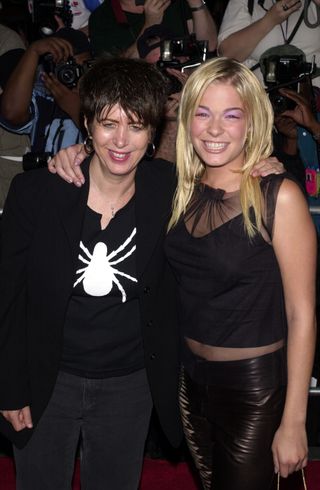
The four songs that Diane wrote for Coyote Ugly included Can’t Fight The Moonlight, which became an international hit for LeAnn Rimes. The movie, about an aspiring songwriter, drew on Warren’s own career for inspiration.
“The director interviewed me a lot,” she reveals, laughing. “That’s why the main character has stage fright. She’s a lot prettier and younger, but some of the other things in there were loosely based on me.”
Does she wish, maybe, that she hadn’t been so candid? ”No. Twenty zillion albums later, I’m glad I told him everything.”
The chart success of Can’t Fight The Moonlight undoubtedly helped Coyote Ugly become a worldwide box office hit. But, as Warren tells us, the song almost didn’t appear in the film at all.
“It was crazy. I’d done another song for the end of the movie, and I kind of knew it didn’t work. I’d seen the footage and didn’t say anything because I didn’t want to have my song taken out. Then the producers realised it as well. The movie was due to be released in a month. I wrote Can’t Fight The Moonlight super-fast, and LeAnn came in and recorded it with Trevor Horn. They re-shot the scene a week before the movie came out. Literally last minute, but it worked.”
Diane Warren’s mastery of the pop song has secured for her the opportunity to have her material recorded by some of the greats, including Elton John, Aretha Franklin, Meat Loaf and Eric Clapton, who recorded her song Blue Eyes Blue for Runaway Bride, the 1999 rom-com that reunited Pretty Woman couple Richard Gere and Julia Roberts.
“I wrote the song and we got Eric Clapton after,” explains Diane. “It was Kathy Nelson again who was doing that movie. I’d written the song, and she said she’d get Eric to do it. I went: ‘Really? You’ll get Eric Clapton to do my song?’ He loved the song, and I loved his version.
“I remember how nice Eric was. People like Paul Stanley and Eric Clapton, who’ve been doing this forever and are huge at what they do, are usually the nicest people. They’re the ones with humility.”
Because they’ve got nothing to prove, perhaps?
“Yes. Or they’re just cool people. I think success really exaggerates who you are. If you’re an asshole, you’ll be more of an asshole. If you keep your feet on the ground you’ll be okay.”
Warren vehemently refuses to play the game where a major artist agrees to do your song on the understanding that they can have a co-writing credit (and the resultant royalties), even though they’ve not contributed anything. This stance has cost her a professional relationship with at least one well-known singer who had previously recorded her songs.
And even though most of Warren’s song writing heroes wrote as part of teams, and she herself has done various very successful co-writes in the past – particularly with Michael Bolton and Albert Hammond – she prefers to work alone these days.
“To be honest, I just want to write songs by myself. Although… I’d loved to have met John Lennon. It would have been cool to write with him. Or just to talk to him and listen to his stories. I’d have been happy with that.
“I’ve met Paul McCartney a couple of times. Once was when we were both up for Academy Awards, and we both lost. We were hanging out backstage, and I said: ‘Wow, if the 14-year-old me knew I was a loser alongside Paul McCartney…!’ Which he thought was funny.”
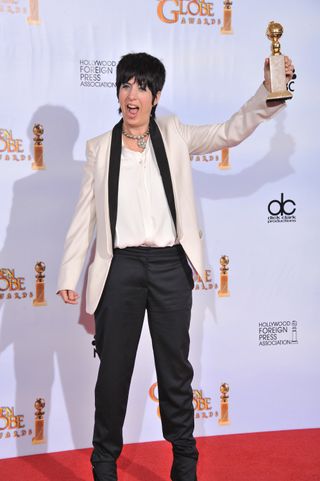
Did the world’s two most successful songwriters try writing a song together when they met? “I’d have been up for that. We didn’t, but it would have been cool. And also a bit intimidating.”
Warren admits to getting a little jittery after agreeing to work with another, less ‘rock’n’roll’ but equally famous UK music export. “Two years ago I did a song called It’s My Time with Andrew Lloyd Webber for the Eurovision Song Contest. I was kind of scared, you know? Once we’d met, I said something funny that broke the ice, because I was nervous. It’s Sir Andrew Lloyd Webber! And I’ve got to be able to tell him something can be better.
“I said when we sat down together that we had to be totally honest with each other. He had to tell me if something could be better or vice versa, because we can’t have our names on a song that’s not really good. He played me something he thought was the chorus and I said: ‘What if we go here from that? Can that be the verse?’ And we did a really good job and were honest with each other.
“Once you realise… he might have been nervous writing with me! Who knows? It’s nerve-wracking, working with somebody new. We’re all insecure at our core.”
Workaholic Diane tells me that she’s getting “fidgety” to get back to her songwriting. But before she goes, any advice for budding songwriters?
“It’s the same as when I was coming up. You have to work hard. You have to knock on doors. Maybe it’s better these days to be in a band or be an artist yourself. Say something in a way that hasn’t been said before.
“Be great,” Diane concludes. “Be different.”
This article originally appeared in AOR #4.
For more classic pop rock from Cheap Trick, then click on the link below.
